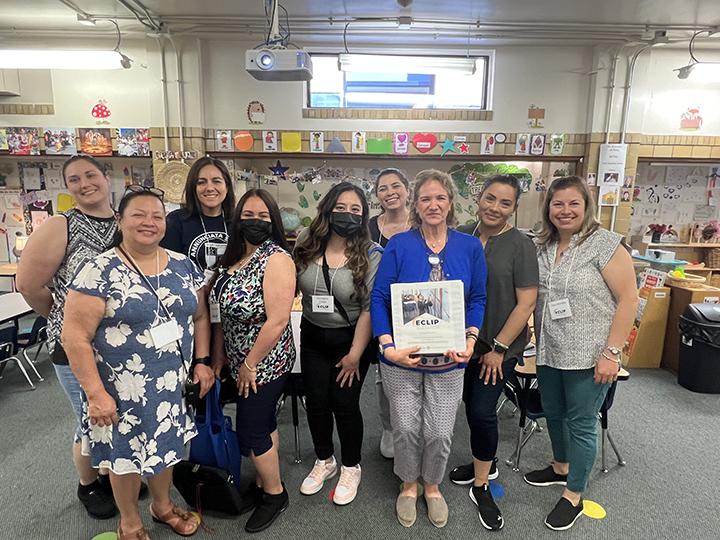As commencement weekend approached and Notre Dame’s campus filled with families of the University’s graduating class of 2022, 12 educators wearing colorful “Maestra” t-shirts mingled among the crowds at the Grotto. They, too, were honoring a milestone and the end of an academic year. Having successfully integrated bilingual instruction into their early childhood programs in Catholic schools in the Archdiocese of Chicago, they were in the spirit to celebrate.

The Archdiocese teamed up with ACE’s English as a New Language (ENL) team in 2021 to pilot the Early Childhood Language Intensive Program (ECLIP) at nine Catholic schools throughout the Archdiocese. Understanding the vital role preschool plays in enrolling future K-8 students and aiming to attract Latino and non-Latino families, the schools committed to finding teachers and working with the ENL team to market and implement high-quality bilingual instruction for three- and four-year-olds.
Utilizing their growing dual-language expertise and partnerships, ENL developed a dynamic early childhood language and literacy curriculum that was integrated daily at the preschool level at each school. Gina Robinson, the longtime Spanish immersion pre-K teacher at Holy Cross School in South Bend, and Paty Salazar Harty, an alumna of ACE Teaching Fellows and ENL Hernandez Fellows and a former dual-language principal in the Archdiocese of Los Angeles, served as instructional coaches throughout the year. They showed ECLIP instructors how to support vocabulary development through chants and games, pass on the faith through songs, and strengthen literacy skills with activities incorporating movements and visual support.
“Being able to teach my native language and share my culture with my students was such a gift, and it sets our school apart from the rest,” said Ceci Morales of St. Mary of the Angels School. Morales had been working as a teacher’s aide before becoming the Spanish instructor as part of ECLIP. Added Veronica Millan, the ECLIP instructor at Pope John XXIII School, “This program gave me the confidence to grow from an aide into a teaching role. It was a very powerful experience for me, inviting me to share my language, culture and stories with children at a very young age when their brains are primed to absorb language.”

Molly Cinnamon, Millan’s principal, said she was enthusiastic about what she was seeing unfold in Millan’s classroom. “This program helped unleash a wellspring of energy in our entire school, not just our preschool,” Cinnamon said. “For the first time ever, we celebrated a bilingual school Mass.”
One of the unique dimensions of the teacher preparation was that all the ECLIP professional development was offered in Spanish. “Offering monthly professional development in our shared language was one of the coolest things I’ve ever done for ACE,” Harty said. “Because we were speaking in Spanish, it was easier to be ourselves and make room for the pedagogical perspectives and practices of Latin America, which only enhances these early childhood classrooms and resonates deeply with Latino families.”
In addition to dynamic language instruction, prayers, songs and read-aloud stories, ECLIP teachers taught daily phonics lessons in Spanish. “It was important to us to teach far more than greetings, colors and numbers,” explained Clare Roach, the coordinator for the ENL program. “We want to create a foundation for these students to be readers and writers in both languages.” Roach said that with few exceptions, English and Spanish phonetic patterns are similar. Teaching letter recognition and sight-sound correspondence in one language only reinforces those skills in the other.
The nine participating schools were so happy with the results of the pilot year that they asked the ENL team to expand the program to kindergarten. Six other schools in the Archdiocese of Los Angeles joined the program this past year, and the Archdiocese of Chicago will add five schools in the upcoming school year.
“Partnering with ENL in projects like ECLIP helps me grow grass roots, authentic efforts at Latino enrollment and engagement throughout the Arch,” said Erika Gallardo, the Hispanic engagement and outreach manager for the Archdiocese of Chicago. “When principals see for themselves how Latino engagement results in enrollment gains and adds vibrancy to the school community, it builds buy-in. Schools experience for themselves how growth in Latino students serves as a pathway to sustainability and transformation. We need more efforts like these across the country.”
Dr. Katy Lichon, the director of ACE’s Catholic School Advantage programs, said that in addition to being rooted in excellent language pedagogy, the program helps participating schools elevate Latino/a educators, an integral strategy in recruiting and retaining Latino families.
“ECLIP represents so much of the best of what we do in ENL to cultivate and share instructional expertise and transform schools,” Lichon said. “This program doesn’t give these schools loaves and fishes to eat, it teaches them how to bake and fish for themselves. ECLIP schools have something very valuable to offer in their bilingual programming and they are building teacher capacity. The best part is that these schools have the enrollment growth to show for it.”

